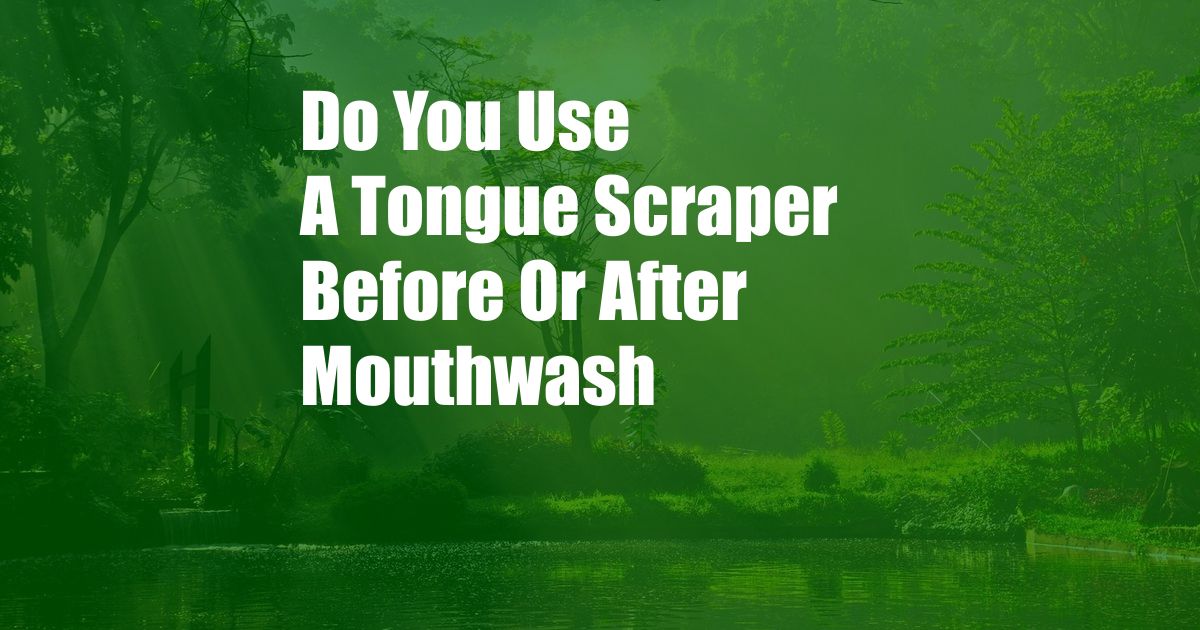
<h2>Do You Use a Tongue Scraper Before or After Mouthwash?</h2>
<p>Maintaining good oral hygiene is crucial for overall health and well-being. Proper brushing and flossing practices are essential, but the tongue often goes overlooked. The tongue harbors bacteria that can contribute to bad breath, tooth decay, and gum disease. Using a tongue scraper can effectively remove these bacteria and improve oral health.</p>
<p>However, the order in which you use a tongue scraper and mouthwash can impact the effectiveness of both. Let's delve into the details to determine the optimal sequence for using these oral hygiene tools.</p>
<h3>Tongue Scraping: Before or After Mouthwash?</h3>
<p>The primary purpose of tongue scraping is to remove bacteria and debris from the tongue's surface. It works by gently scraping off the white or yellow coating that can accumulate on the tongue, particularly in the morning.</p>
<p>Using a tongue scraper before mouthwash offers several advantages. Firstly, it allows the tongue scraper to remove the bacteria more effectively. When you use mouthwash before scraping, the bacteria may be loosened but not fully removed, making it more challenging for the scraper to reach them. Secondly, scraping before mouthwash prevents the bacteria from being pushed back onto the tongue by the mouthwash.</p>
<h3>Mouthwash: A Supplementary Measure</h3>
<p>Mouthwash is a liquid solution that contains antimicrobial agents designed to kill bacteria in the mouth. It serves as a supplementary measure to brushing and flossing, reaching areas that these tools cannot easily access.</p>
<p>Using mouthwash after tongue scraping can enhance the overall effectiveness of your oral hygiene routine. By killing the remaining bacteria, mouthwash helps further reduce bad breath and improve oral health. However, it's important to note that mouthwash alone cannot fully replace the benefits of tongue scraping.</p>
<h3>Tips and Expert Advice</h3>
<p>For optimal results, follow these tips and expert advice when using a tongue scraper and mouthwash:</p>
<p><strong>Use a gentle touch</strong>: When scraping your tongue, apply gentle pressure to avoid irritation or damage. Scraping too aggressively can cause discomfort and promote bleeding.</p>
<p><strong>Scrape your tongue daily:</strong> Incorporate tongue scraping into your daily oral hygiene routine. Regular scraping helps prevent bacteria buildup and promotes a healthier mouth.</p>
<p><strong>Choose a good quality tongue scraper:</strong> Invest in a durable and effective tongue scraper made from stainless steel or a similar material. Avoid using plastic scrapers, as they may harbor bacteria.</p>
<p><strong>Rinse your tongue scraper after use:</strong> After each use, thoroughly rinse the tongue scraper with warm water to prevent bacteria buildup. Allow it to air dry completely.</p>
<h3>FAQs</h3>
<p><strong>Q: Why is it important to scrape your tongue?</strong></p>
<p>A: Tongue scraping removes bacteria that can cause bad breath, tooth decay, and gum disease.</p>
<p><strong>Q: How often should I scrape my tongue?</strong></p>
<p>A: Ideally, scrape your tongue once or twice daily, especially in the morning.</p>
<p><strong>Q: Can I use mouthwash instead of scraping my tongue?</strong></p>
<p>A: Mouthwash is not a substitute for tongue scraping. Both methods complement each other for optimal oral hygiene.</p>
<h3>Conclusion</h3>
<p>Incorporating both tongue scraping and mouthwash into your oral hygiene routine is essential for maintaining a healthy mouth. By scraping your tongue before mouthwash, you maximize the effectiveness of both tools, removing bacteria and improving your oral health. Embrace these tips and expert advice to achieve a brighter, fresher smile.</p>
<p>Are you interested in learning more about tongue scraping and mouthwash? Share your questions and experiences in the comments section below.</p>
